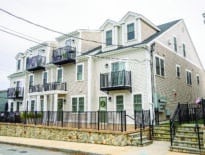Moddie Turay
President and CEO, Massachusetts Housing Investment Corp.
Age: 48
Industry experience: 24 years
A new fund managed by Massachusetts Housing Investment Corp. will offer financing to preserve private but moderately-priced housing, adding to the Boston-based nonprofit’s growing role in the housing market. Deep-pocketed institutions and the city of Boston contributed seed money to the revolving Boston Acquisition Fund. As administrator, MHIC will work with developers that commit to keeping rents affordable after acquiring properties. CEO Moddie Turay, MHIC’s CEO since 2022, previously worked in community development roles as an assistant to Washington, D.C. Mayor Anthony Williams in Washington, D.C. and an executive for the Detroit Economic Growth Corp.
Q: How does MHIC fit into the housing ecosystem?
A: We’ve invested over $3.5 billion over our now-35-year history, and $500 million of that is in Roxbury alone. We are the largest nonprofit [low-income tax credits] syndicator in Massachusetts. We also invest in Rhode Island and Connecticut and we’re looking to expand into upstate New York in 2025. Over the years, we’ve really been a partner with the state and the city with both private and nonprofit developers and small business owners. It literally says in our mission statement “to finance projects that others will not.” We go into neighborhoods well before and work with developers on projects before some of them are bankable by your traditional banks. So we are that entrepreneurial community finance partner for projects like that.
Q: What is the strategy of the new Boston Acquisition Fund?
A: It’s anti-displacement with a focus also on keeping units that have the potential to remain affordable, even if it’s a vacant building that’s going on the market, or a building that is on the market that is currently affordable, that could change hands and go to a developer who would raise rents. If we’re not focusing on preserving what we actually have, then that’s the hole in the bucket. You have to concern yourself with building new, and preserving what you have. The fund, and the partnership with the city, allows that to happen. There has to be flexibility and there has to be speed. These are private transactions that are happening. We’re trying to equip like-minded developers or apartment owners to be incentivized and be competitive in the marketplace, to go out and grab these properties and keep them affordable. To do that, they need low-cost capital, and they need speed to compete with the private marketplace.
Q: Has the fund exhausted most of the major institutional donor pool?
A: I think there is a lot of opportunity to raise. I wouldn’t say all the low-hanging fruit has been tapped. There are a lot of partners we are in conversations with that will invest in the fund. We are in constant contact with a lot of the other potential investors and donors. We’re already looking at deals. We could start deploying any day now. We’re not waiting to have the entire fund funded.
Q: How does the $50 million Developers Impact Fund work and when will it begin selecting projects?
A: We approved our first round of projects before the end of the year. That is funded by $50 million from the state, and we are going to raise additional funds. But right now, we are focused on the deployment of the first $50 million and we are making loans and will make an announcement shortly. The fund will offer predevelopment and growth capital through lines of credit and other financial assistance.
Q: Has Boston’s emphasis on fast-track approval of affordable housing proposals made an impact?
A: We have to be doing everything everywhere at once. The ARPA money is starting to run out. People are having to get really creative to get these projects across the finish line. We at MHIC also invest in market-rate, which is also important to affordable housing. I get almost as excited about market-rate housing being built in Boston and other communities, because it takes the pressure off affordable housing. For Massachusetts, what used to be considered a starter home is no longer a starter home. If you have what used to be a starter home competing with someone who has a higher spending limit than you do, you’re going to lose every time. The only way we work our way out of that is to solve for all of these segments in our market.
Q: What are MHIC’s top priorities for 2025?
A: We have spent all of our Healthy Neighborhoods II fund, which was about $42 million, so we’ll be focused on fundraising for Fund III, a $50 million fund. We actually score projects based upon health outcomes: communities that embrace healthy outcomes, walkability and proximity to healthy food and hospitals and health services. And we are hyper-focused on working with the city on their programs and MassHousing on the Equitable Developers Fund, and looking at how we can expand our [low-income tax credit] platform in Massachusetts.
Turay’s Five Favorite Leisure Activities:
- Exhibitions at Isabella Stewart Gardner Museum
- Lunch at Nubian Market in Roxbury
- Morning workout at The ‘Quin House
- Walking through Boston Common on his way to work
- Spending time at the Boston Public Library with his family






